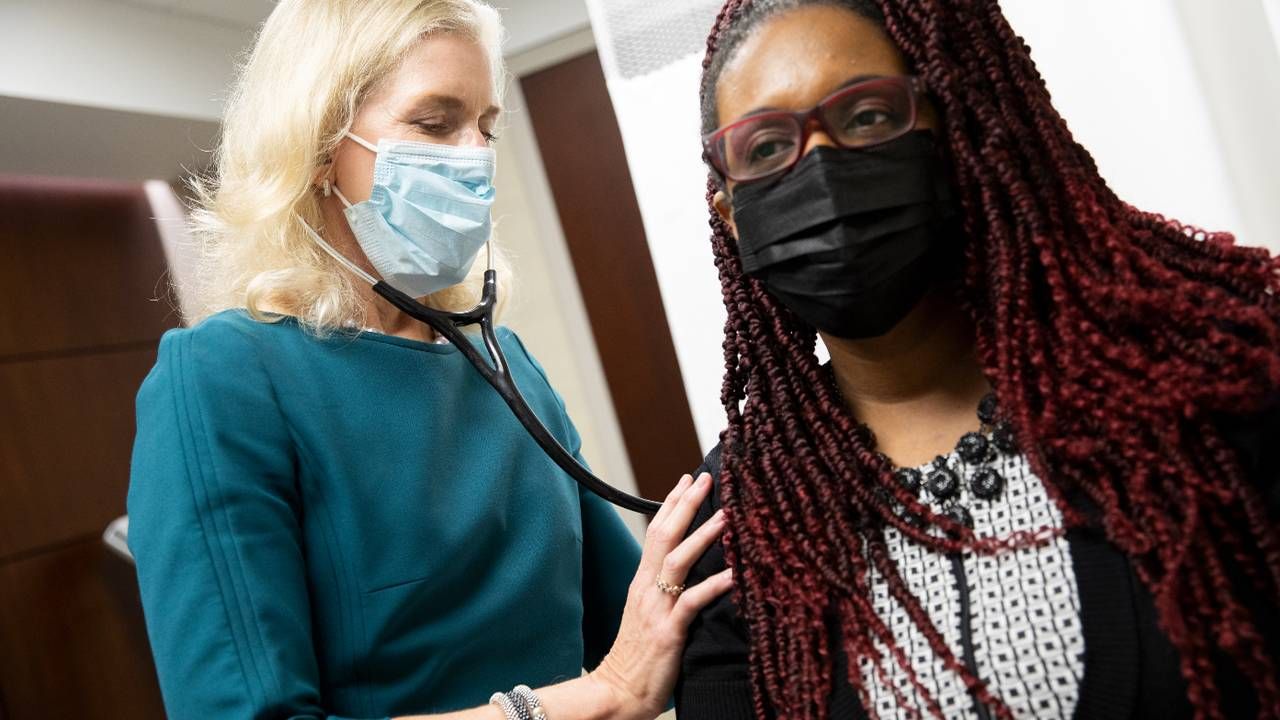Are You Postmenopausal and Still Having Hot Flashes? You’re Not Alone
Hot flashes are supposed to get better with time, but that's not always the case. So, what solutions are available for women?
Editor’s note: In honor of Menopause Awareness Month, we are running a series of stories about menopause. Our goal is to illuminate a topic that is sometimes shrouded in misinformation and shame. We hope to change that.
Did you think your hot flashes and night sweats would stop after your last period? Not so fast. Sorry to be a Debbie Downer, but menopausal symptoms can continue after menopause, sometimes for many years. And it's more common than you might think.

Menopause and Typical Symptoms
Women reach menopause once it's been 12 months since their last menstruation. "The average age of menopause in the U.S. is fifty-two years," says Dr. Stephanie Faubion, director of Mayo Clinic Women's Health, medical director of The North American Menopause Society (NAMS) and a National Certified Menopause Practitioner (NCMP). "But anything after the age of forty-five is considered normal, and about ninety-five percent of us have gone through menopause by the age of fifty-five."
The most typical symptoms of menopause are hot flashes and night sweats, also known as Vasomotor symptoms (VMS). VMS result from a dysfunction in temperature regulation caused by hormone changes. Additional symptoms include sleep and mood disturbances, vaginal dryness, increased urinary frequency and incontinence, even joint pain, according to Faubion.
Menopausal Symptoms After Menopause
Hot flashes and night sweats tend to get better with time. "Unfortunately, they can also last a long time," says Faubion. "We know that at least a third of women are going to hot flash moderately to severely for a decade or more."
"We know that at least a third of women are going to hot flash moderately to severely for a decade or more."
Several studies support the fact that VMS and other menopausal symptoms can continue after menopause.
In a study of 85-year-old Swedish women, 16% experienced hot flashes during the day or night. You read that right: 85-year-old women! A 2015 study of 2,000 Australian women found that hot flashes were present in 42% of the women 60 to 65 years old, according to Science Daily.
Another survey was conducted by the Mayo Clinic, based on women who came in for a menopause consultation. It showed that 18% were 60 or older, and of those, 41% reported VMS. The vast majority of the women in all these studies experiencing VMS were not taking hormone therapy.
Hormone Therapy
"Hormone therapy (HT), offered in a pill, gel, ring, cream or spray form, is the most effective therapy for relief of menopausal symptoms," says Faubion. It's not recommended if you've had breast cancer, a blood clot, heart attack or stroke, or if you're at high risk for breast cancer or heart disease.
HT typically includes the natural or synthetic versions of the two main sex hormones that women have: estrogen and progesterone (the group of natural and synthetic versions is called progestogen). Both of these hormones decline during the menopause transition. Low estrogen levels are a contributor to hot flashes and can lead to bone loss. Progesterone has an important role in reproduction and also influences sleep and mood.
"Hormone therapy (HT), offered in a pill, gel, ring, cream or spray form, is the most effective therapy for relief of menopausal symptoms."
There are many Food and Drug Administration (FDA)-approved HT options, including estradiol (a type of estrogen) products which are chemically and structurally identical (so-called bioidentical) to what the ovary produced before menopause. In 2018, the FDA approved Bijuva, the first bioidentical hormone therapy combination of estradiol and progesterone in a single capsule for the treatment of moderate to severe VMS.
One important piece of information is that doctors don't recommend starting HT after age 60. That's because the ratio of risks to benefits is less favorable, says Faubion. She says the only time she recommends women over 60 use HT is when they had used it earlier and tried stopping it once hitting 60, but still had problematic menopausal symptoms (and after a full discussion about risks and benefits). In some cases, women who start HT closer to the time of menopause may continue to use it after 60 to manage symptoms or to meet treatment goals.
One caveat: there is a modest increased risk of breast cancer with the use of HT.
In a study conducted by the Women's Health Initiative, an additional nine women per 10,000 women per year who used the combination of estrogen and a progestogen HT got breast cancer after about five years of treatment. Women without a uterus who used only estrogen (those who've had hysterectomies don't need a progestogen to prevent overgrowth in the uterine lining) actually had a small reduction in breast cancer risk.
Other Ways to Relieve Menopausal Symptoms Over 60
If HT is not an option, a low dosage of the antidepressant paroxetine (brand names Brisdelle and Noven), is FDA-approved to help manage VMS. Several other antidepressants are used off-label for management of hot flashes, including venlafaxine (Effexor XR), citalopram (Celexa) and escitalopram (Lexapro).
Another therapy for hot flashes in postmenopausal women is hypnosis, which research supports. In addition, research also proves that Cognitive behavior therapy (CBT), or talk therapy, is effective for hot flashes.
Lifestyle Changes Can Also Help Relieve Hot Flashes
"Hot flashes happen because of low estrogen levels," says Dr. Mindy Pelz, author of "The Menopause Reset: Get Rid of Your Symptoms and Feel Like Your Younger Self Again," and a holistic health expert specializing in menopause. "When estrogen plummets in the postmenopausal years, it triggers the hypothalamus to turn up the heat. Because of this, it is imperative that postmenopausal women make their cells receptive to the low levels of estrogen that their body is producing."
"When estrogen plummets in the postmenopausal years, it triggers the hypothalamus to turn up the heat."
Pelz suggests two ways to help the cells respond to estrogen better: "First, make yourself insulin sensitive. When insulin surges in the body, estrogen will decline, leaving a postmenopausal woman experiencing hot flashes."
The best way to balance insulin out, says Pelz is by intermittent fasting.
"The second tip to help postmenopausal woman with hot flashes is to increase consumption of leafy green vegetables," Pelz says. "Vegetables feed the bacteria in the gut known as the estrobolome. This bacteria breaks down estrogen so that the cell can put estrogen to use. When a postmenopausal woman intermittent fasts and increases her vegetable consumption, hot flashes will diminish."
While you've probably seen or heard about supplements and other over-the-counter remedies for menopause symptoms, there is not much research to support their effectiveness. One exception is magnesium.
In 2011, researchers studied the effects of magnesium on breast cancer survivors who were experiencing as many as 14 hot flashes a day. "They found that supplementing anywhere from four hundred to eight hundred mg of magnesium daily reduced their hot flashes by more than 50%," says Natalie Jurado, magnesium expert and founder of Rooted In, which sells magnesium products.
Future Help for Menopause Symptoms
With an aging population, and organizations such as NAMS advocating for the study of menopause and relief of menopausal symptoms, expect more hormonal and non-hormonal medications to become available.
Case in point: "There is a new category of non-hormonal medications that may be FDA-approved in the next year or so for management of hot flashes," says Faubion. "The NK3 receptor inhibitors are under phase three trials right now, and initial studies are quite promising."


